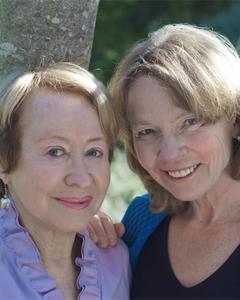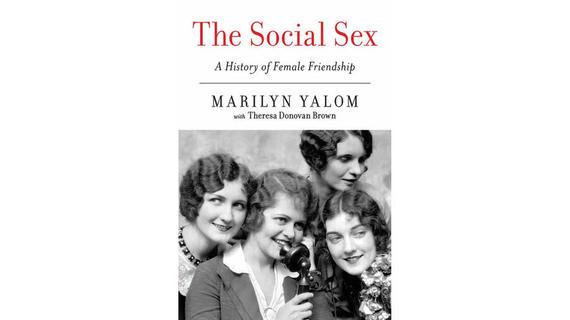It happens that the right book of the moment shows up right on your doorstep: The Social Sex: A history of Female Friendship, by Marilyn Yalom, co-written with Theresa Donovan Brown, was presented fresh off the press at my favorite local bookstore, The Book Passage, in Corte Madera. I've been a long-time fan of the author and her many studies of women's history, and as an ex-Parisian I particularly liked Yalom's , How the French Invented Love.
From Pals to Passion
This was the perfect way to dive into The Social Sex -- a book shock-full with stories, historical discoveries, and intelligent reflections on women. "Popular wisdom tells us that women are basically more sociable ... more 'friendly,'" Marilyn Yalom and Theresa Donovan Brown began their presentation. The authors, long-time friends and colleagues, launched into a playful mutual interview accompanied by slides (which unfortunately are missing from the book), tracking the history and "herstory" of female friendship through the centuries. They clarified that they see friendship among women on a large spectrum: from being pals to romantic bonds and passionate, even erotic attachments. But no "lesbian" labels, please! The authors prefer the ambiguity that has followed friendships as far back as historical records (and women's literacy) allow.
The authors:
The first historical example cited was the German mystic nun and composer Hildegard von Bingen, whose passionate letters to another nun have been preserved from the 12th century. But countless striking examples followed, contradicting the long prevailing notion that only male friendships were noteworthy, noble and admirable (as in the "bromance" model of Jesus and the Apostles), while women were seen as defined by ignoble rivalries and intrigues.
Friendship Quilts
In America, the place of friendship often was a social group. Women came together to do arts and crafts, quilting "friendship quilts" with the names of every friend stitched into the cloth for times eternal. Whether bible study groups, salons or clubs (comparable to today's book clubs), women's friendship meetings became the nucleus of social movements. The heroines of abolition or suffrage--like Susan B. Anthony and Elizabeth Cady Stanton--were passionate friends. Around the turn of the century, college education created the "New Woman": a slide showed the 1899 Stanford Women's Basketball Team. There were books like Vera Brittain's Testament of Friendship (a recent movie is based on her novel Testament of Youth), stating, "the friendships of women in spite of Ruth and Naomi, have usually been not merely unsung, but mocked, belittled, and falsely interpreted." Nobody would have more agreed than Virginia Woolf, the authors reminded us: A Room of One's Own, postulated friendship as nothing less than love.
Sisterhood is Powerful
Eleanor Roosevelt and the political influence of her circle of women friends came up. Then the conventional fifties invented their fashion of foursomes: two married couples spending time together. But not for long: with the slogan "Sisterhood is Powerful!" the sixties' feminists rocked the boat, granting large permission to the "sisters" to experience erotic love between women.
Yalom reported how differently her own pre-feminist generation viewed their friendship priorities, compared to her post-feminist daughters. Before the feminist revolution, women would postpone a girlfriend date if a boyfriend called. Not so any more. Today's BFFs (represented in TV shows like Broad City) seem to be "more than trending": friendships among women are a necessity of life even in marriage.
Four Characteristics
To sum up the topic, Yalom and Brown defined the four basic characteristics of women's friendships: 1. Affection and fondness. 2. Self-revelation, sharing secrets (from men) 3. Physical contact of tenderness and warmth. 4. Interdependence--the motherly, neighborly, altruistic drive to help each other.
You can still catch the inspiring presentation in the SF Bay Area, and then in New York, and if you miss the authors, you'll find other easy ways to bring their book to your doorstep.
Meet the Authors
Tuesday, October 6, 2015
BOOKS, INC. (Opera Plaza) San Francisco, 601 Van Ness, CA 94102
Ph: (415) 776-1111
Arrival: 6:45 p.m.
Begin: 7:00 p.m.
End: 9:30 p.m.
Wednesday, October 7
MRS. DALLOWAY'S 2904 College Avenue, Berkeley, CA 94705
Ph: (510) 704-8222
Arrival: 7:15 p.m.
Begin: 7:30 p.m.
End: 9:00 p.m.
Monday, October 26
92nd STREET Y, 1395 Lexington Ave (at 92nd St.) NEW YORK NY 10128
Ph: (212) 415-5500
Begin: 12: 00 noon
End: 1:00 p.m.
Wednesday, October 28
BLUESTOCKINGS Book Store, 172 Allen St, New York, NY 10002
Ph: (212) 777-6028
Begin: 7:00 p.m.
End: 8:00 p.m

